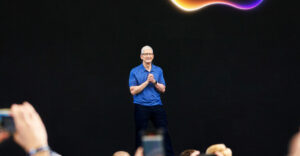
Making a set of New Year’s resolutions for myself is certainly helpful but generally not nearly as much fun as making them for others. The year 2003 has been a time of change. It has brought a lot of exciting new experiences for me, and, frankly, I’d like fewer of them in 2004.
It is at this time of year that corporations often reflect on strategies for the future. So here are my New Year’s resolutions for them.
In short, SBC should resolve to support Apple, Sony to get along with itself, Apple to license key technology, IBM to get in or out of the PC business, PalmSource to get another customer, Microsoft to get back to one desktop operating system, and all of us to have more fun in 2004.
SBC: Stop blaming everything on Microsoft.
If you called SBC for DSL support in Silicon Valley in 2003 and wanted to use an Apple computer, you were told, “Sorry, we don’t support those.” Having set up a few Apples myself on SBC’s network, I can say that the only real issue is supporting the users who have to use the horrid SBC client software, which doesn’t run on an Apple.
Most of us wish it didn’t run on Windows either. Routers are easier to support than PCs with custom clients. Apple users, because they appear to be using iTunes more than Kazaa, use less network bandwidth so it makes good business sense to support Apple PCs connected to routers.
SBC also got into the habit of blaming everything that broke on Microsoft and the virus problem. Even when SBC pulled a router and turned off ports, its canned response was, “Download the latest patch from Microsoft and call Microsoft support” — even though, with a router out, you couldn’t download anything and the suggested remedies would not have addressed either problem.
Own up to your own problems, SBC. Blaming Microsoft for everything doesn’t actually fix anything, and putting lots of customers into voice-mail hell is not, in the long run, good for customer retention and business growth.
Sony: Figure out how to get along with yourself.
Sony builds some of the coolest products on the market. What is frustrating is that they don’t seem to work together all that well. The PC group, the PlayStation group and the consumer electronics group seem to have trouble seeing a future in which they all survive. Watching that company is like watching a family of overachievers with huge domestic problems.
With the PC market converging with the consumer electronics market, Sony is in the right place at the right time and needs to get out of its own way if it wants to own this space. Sony should resolve to get its children to play together nicely.
I can understand Sony’s fondness for the technology it developed; I can’t understand why it would want to make the same mistake over and over again. At the very least, Sony should put SecureDigital memory slots into all of its hardware as well as the Memory Stick, so as not to put that hardware at a competitive disadvantage. SecureDigital is the VHS standard at this time. Sony should allow for both memory types and let the consumer have a choice of which one to use.
Apple: Stop making the same mistake and license your technology.
For those who follow Apple, the biggest mistake the company made in the 1980s was the failure to license its user interface, which would have made it the PC standard rather than a niche player.
With iTunes, the company currently has the largest market share of any paid music service. But because it won’t license its DRM technology, its iPod only works with iTunes, and iTunes only works with one secure MP3 player — the iPod.
This is called customer lock-in. IBM made customer lock-in a cornerstone of its dominance until Microsoft showed that you could own a market through licensing.
Apple builds strong products that can compete on a level playing field, so the company doesn’t need to lock in customers to be successful. The lock-in strategy is one typically used by a company that knows it can’t compete on design or technology. Step up to the plate, Apple, and give your customers a choice. By doing so, you will expand your market opportunities.
IBM: Decide what you are going to become and get it done.
The constant speculation that you are going to become a software-services company and eliminate your hardware businesses is a huge distraction. Just putting those businesses on life support as you make up your mind puts customers and partners at risk and certainly isn’t an efficient use of your own resources.
Either give the divisions the funding they need to be successful or cut them loose. The middle ground is the kind of slow death you shouldn’t wish on an enemy — let alone a member of your own family.
Wondering whether IBM as a PC company or IBM as a microelectronics company is going to be around by the end of the decade does neither group any good. The choice is yours, for goodness sakes. Make it and move on.
PalmSource: Get a new customer.
After PalmOne and PalmSource split, I believed that PalmOne would be in trouble and PalmSource would be the power player. However, PalmOne has executed with strong hardware and, through the purchase of Handspring, has moved to dominate the Palm market again.
If PalmOne were to pick up another platform, be it Linux or Microsoft — either would make sense, if only as a hedge — then PalmSource likely would be put on deathwatch. PalmSource must close a deal with another branded OEM before that happens — and the clock is ticking.
With both the Microsoft and Palm platforms using the same hardware, there were a couple of Pocket PC vendors looking at doing both platforms on a single device (configure to order). Getting one of them actually to do this would go a long way toward ensuring a bright and prosperous future for PalmSource.
Sun: Get over Microsoft.
Everything doesn’t have to be a war with Microsoft. You folks are in the “hardware” business. Your natural competitors are HP, IBM and Dell — not Microsoft. The most common complaint I’ve heard through 2003 about you is that you spend all of your time taking potshots at Microsoft and virtually none of your time explaining why someone should choose Sun.
All you need to do is look at your stock price to determine that the “attack Microsoft” strategy is not working. Put your effort into showcasing what Sun can do, position yourself against what the others can’t do, and leave the Microsoft bashing to the folks that are actually in the software business.
Microsoft: Lose the Home Edition of Windows.
Choosing to focus on Windows XP Home Edition was clearly a “pick one” kind of thing. Many readers likely would reel off a list of issues with the company that could fill several columns. However, according to my e-mail over the holidays and the animosity that has built up among IT departments and OEMs for what they collectively feel is overcharging, I think it is time for Microsoft to put the Home Edition mistake behind it and move to a single, low-cost OS for the mainstream market.
This dual OS strategy has antagonized users, has been a boost to Linux and has been a cornerstone for arguments against Microsoft’s platforms since it was released. In the current competitive environment, I think it is time to recognize that, strategically, it was a very bad idea.
For everyone, including myself, let us resolve to have more fun in 2004. I can recall my favorite boss, Dan Roth, who told me on my first day of work that his one goal was that I have fun doing it. I’ve forgotten that from time to time — but I hope that, along with me, you’ll all resolve to have more fun in 2004. Compared with 2003, it should be a very good year.
Rob Enderle, a TechNewsWorld columnist, is the Principal Analyst for the Enderle Group, a company founded on the concept of providing a unique perspective on personal technology products and trends.





















































